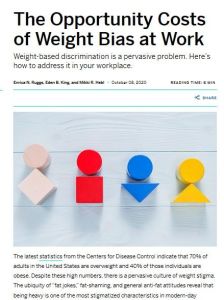Join getAbstract to access the summary!

Join getAbstract to access the summary!
Enrica N. Ruggs, Eden B. King and Mikki R. Hebl
The Opportunity Costs of Weight Bias at Work
Weight-based discrimination is a pervasive problem. Here’s how to address it in your workplace.
MIT Sloan Management Review, 2020
What's inside?
Learn to recognize and reduce weight-based bias in the workplace.
Recommendation
Harvard research shows that racial and gender bias have abated over the past decade – but one form of bias is increasing: weight-based bias. To help managers understand the prevalence and negative impacts of weight discrimination, MIT Sloan Management Review offers a concise article from three experts in management and psychology. Enrica N. Ruggs is director of the Center for Workplace Diversity and Inclusion at the University of Memphis, Eden B. King is professor of psychology at Rice University, and Mikki R. Hebl is professor of psychology and management at Rice.
Summary
About the Authors
Enrica N. Ruggs is an assistant professor of management and director of the Center for Workplace Diversity and Inclusion at the Fogelman College of Business and Economics at the University of Memphis. Eden B. King is the Lynette S. Autrey Professor of Psychology at Rice University. Mikki R. Hebl is the Martha and Henry Malcolm Lovett Professor of Psychology and a professor of management at Rice University.


















Comment on this summary